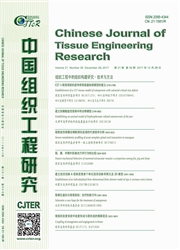

 中文摘要:
中文摘要:
目的观察骨骼肌胰岛素样生长因子-1受体及胰岛素受体的功能缺失(Mouse overexpressing adominant-negative IGF-Ⅰ receptor specifically in muscle,MKR mouse)转基因2型糖尿病小鼠的血糖及其生长情况。方法由美国国立卫生研究院(NIH)授权使用引进的MKR鼠,经自然交配后繁殖的子代作为研究对象,制备尾组织基因组DNA,经聚合酶链反应得到扩增产物,1%琼脂糖凝胶电泳观察鉴定。同时对MKR鼠子代出生后的血糖、体重、胰岛素定时检测。同期采用昆明种小鼠或C57野生型小鼠进行对照。结果MKR鼠所有子代鼠均会出现长度为330 bp的DNA片段,表明该MKR鼠后代能稳定遗传。新生MKR鼠自出生3周开始,即出现显著的血糖增高,5周以后血糖则较稳定地维持在高水平。与对照组小鼠同期的血糖比较,差异具有非常显著性意义(P〈0.01)。其体重增长随年龄的增长而减慢,至4月龄时体重基本稳定,但无下降趋势。MKR鼠在2月龄时即表现出显著的高胰岛素血症及糖耐量低下,与对照组小鼠同期比较,亦具有非常显著性意义(P〈0.01)。MKR鼠在生长过程中无自然死亡发生。结论MKR鼠是至今为止一种非常良好的2型糖尿病的动物模型。
 英文摘要:
英文摘要:
Objective To develop a diabetic mouse model to investigate metabolic changes of blood glucose level and body weight in the MKR mouse, a model in which expression of a dominant-negative IGF-I receptor in the skeletal muscle leads to systemic insulin resistance and diabetes. Methods MKR mice were received from the National Institutes of Health, USA, and genotyped by a specific PCR reaction using tail DNA. These mice were followed up for blood glucose level and body weight once a week from 1 to 16 weeks of age. The serum insulin level and glucose tolerance were determined at two months, using wild-type Kunming mice or C57 mice as controls. Results The offspring of MKR mice exhibited stable transgenic hereditary. These mice were hyperglycaemic from 3 weeks of age onward. The body weight increase slowed down after 4 month. There was 20-fold hyperinsuhnemia in MKR vs. wild-type littermates, and very significant glucose intolerance in 2-month-old MKR mice. The hyperglycemia is more severe in male especially older male MKR mice, than their female counterparts. Conclusion We have estabolished the MKR model, set up a PCR reaction to genotype and revealed sexual dimorphic changes in the type 2 diabetes.
 同期刊论文项目
同期刊论文项目
 同项目期刊论文
同项目期刊论文
 期刊信息
期刊信息
